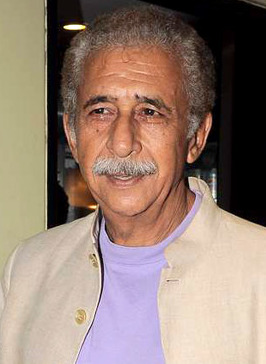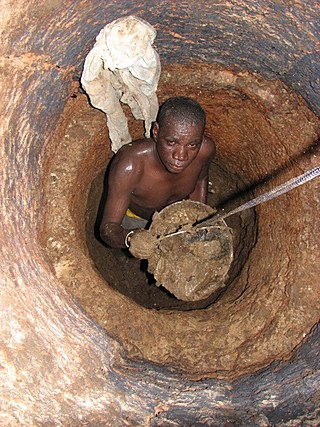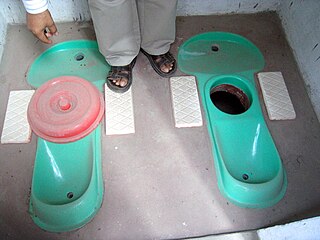The World Toilet Organization (WTO) is a global non-profit organization whose goal is to improve toilet and sanitation conditions worldwide. It was founded in 2001 with 15 members and has now grown to 151 member organizations in 53 countries. The WTO is also the organizer of the World Toilet Summit, the Urgent Run and initiated the United Nations World Toilet Day.

Dhondo Keshav Karve, popularly known as Maharshi Karve, was a social reformer in India in the field of women's welfare. He advocated widow remarriage, and he himself remarried a widow as a widower. Karve was a pioneer in promoting widows' education. He founded the first women's university in India, the SNDT Women's University in 1916. The Government of India awarded him with the highest civilian award, the Bharat Ratna, in 1958, the year of his 100th birthday. He organized a conference against the practice of devdasi. He started 'Anath balikashram' an orphanage for girls. His intention was to give education to all women and make them stand on their own feet. Through his efforts, the first women university was set up in 20th century.

Sulabh International is an India-based social service organization that works to promote human rights, environmental sanitation, non-conventional sources of energy, waste management and social reforms through education. The organization counts 50,000 volunteers. Sulabh International is the largest nonprofit organization in India.

Naseeruddin Shah is an Indian actor. He was notable in Indian parallel cinema and has starred in various international productions. He has won numerous awards in his career, including three National Film Awards, three Filmfare Awards and the Volpi Cup for Best Actor at the Venice Film Festival. The Government of India honoured him with the Padma Shri and the Padma Bhushan awards for his contributions to Indian cinema.

Manual scavenging is a term used mainly in India for "manually cleaning, carrying, disposing of, or otherwise handling, human excreta in an insanitary latrine or in an open drain or sewer or in a septic tank or a pit". Manual scavengers usually use hand tools such as buckets, brooms and shovels. The workers have to move the excreta, using brooms and tin plates, into baskets, which they carry to disposal locations sometimes several kilometers away. The practice of employing human labour for cleaning of sewers and septic tanks is also prevalent in Bangladesh and Pakistan. These sanitation workers, called "manual scavengers", rarely have any personal protective equipment. The work is regarded as a dehumanizing practice.

Shekhar Pathak is a historian, editor, publisher, activist, and traveller from Uttarakhand, India. He is known for his extensive knowledge of the history of colonial and postcolonial social movements and contemporary environmental and social issues in Uttarakhand, and colonial exploration in the Himalayas and Tibet. He has also been engaged in activism for various social and environmental causes since the 1970s.

Swachh Bharat Mission (SBM), Swachh Bharat Abhiyan, or Clean India Mission is a country-wide campaign initiated by the Government of India on 2 October 2014 to eliminate open defecation and improve solid waste management and to create Open Defecation Free (ODF) villages. The program also aims to increase awareness of menstrual health management. It is a restructured version of the Nirmal Bharat Abhiyan which was launched by the Congress in 2009.
Deviprasad Dwivedi is an Indian writer and teacher, known for his scholarship in Sanskrit literature. The Government of India honoured Sharma in 2011, with the fourth highest Indian civilian award of the Padma Shri and followed it up with Padma Bhushan, the third-highest civilian award, in 2017.
Gullapalli Nageswara Rao is an Indian ophthalmologist, the chairman of the Academia Ophthalmologica Internationalis (AOI) and the founder of the L. V. Prasad Eye Institute, Hyderabad. A former associate professor at the School of Medicine and Dentistry of the University of Rochester, Rao is a Fellow of the National Academy of Medical Sciences, India. He was honored by the Government of India, in 2002, with the fourth highest Indian civilian award of Padma Shri. He was elected in 2017 to the Ophthalmology Hall of Fame instituted by the American Society of Cataract and Refractive Surgery.

The Sulabh International Museum of Toilets in Delhi is run by the Sulabh International, dedicated to the global history of sanitation and toilets. According to Time magazine, the museum is one of the weirdest museums among the "10 museums around the world that are anything but mundane". It was established in 1992 by Dr. Bindeshwar Pathak, a social activist, founder of Sulabh Sanitation and Social Reform Movement, recipient of national and international awards including the Stockholm Water Prize in 2009. His objective in establishing this museum was to highlight the need to address the problems of the sanitation sector in the country, considering the efforts made in various parts of the world in this field since the third millennium BCE.
Ashok Bhagat, popularly known as Baba ji, is an Indian social worker and the secretary of Vikas Bharti, a non-governmental organization working for the upliftment of rural population of Jharkhand. He was born in the Indian state of Uttar Pradesh, holds a master's degree in Arts and a graduate degree in Law and is a nominated leader of Swachh Bharat Abhiyaan campaign for the state of Jharkhand. The Government of India honoured him in 2015 with the Padma Shri, the fourth highest Indian civilian award for his contributions to the area of social service.
Natwar Thakkar, popularly known as Natwar Bhai, was an Indian social worker who worked in Nagaland. He came from Maharashtra but migrated to Nagaland for social work at the age of 23. He founded the Nagaland Gandhi Ashram at Chuchuyimlang village in the Mokokchung district of Nagaland. Because of his efforts to spread Gandhian philosophy in Nagaland and his social work, he was known as "Nagaland's Gandhi".
Vitthal Laxman Phadke, better known as Mamasaheb Phadke, was an Indian social worker, writer and Gandhian, known for his sanitation services to the rural areas in British India. He was one among the leaders of the Sanitation Brigade, comprising 1200 volunteers, set up by the 1938 Haripura session of the Indian National Congress. The Government of India awarded him its third-highest civilian honour, the Padma Bhushan, in 1969, for his contributions to society.
Ram Harsh Singh is an Indian practitioner of the Ayurveda system of alternative medicine and the founder vice chancellor of Dr. Sarvepalli Radhakrishnan Rajasthan Ayurved University. An Emeritus Professor of Banaras Hindu University and a National Professor of the Ministry of AYUSH of the Government of India, he was conferred with the fourth highest civilian honour of Padma Shri, in 2016.
Onkar Nath Srivastava was an Indian material physicist, an Emeritus professor of Banaras Hindu University and the vice president for India and South Asia of the International Association for Hydrogen Energy, who was known for his contributions to the disciplines of nanotechnology and hydrogen energy. He was the author of two books and over 440 scientific papers and a recipient of several honors including Shanti Swarup Bhatnagar Prize, the highest Indian award in the science and technology categories. The Government of India awarded him the fourth highest civilian honour of the Padma Shri, in 2016, for his contributions to science and engineering.
Usha Chaumar is a social worker from Alwar, Rajasthan, India. She is the President of Sulabh International Social Service Organisation, the non-profit arm of Sulabh International. In 2020, she received the Padma Shri honour from the Government of India for her contribution in the field of social work, particularly in raising awareness against manual scavenging.
Gamit Ramilaben Raysingbhai is a tribal social worker from Taparwada Village, Tapi district, Gujarat, India, known for her work in transforming several villages in Gujarat to open-defecation free villages. She is also known for her work for the empowerment of rural women by setting up a large number of self help groups of women. In the year 2022, the government of India honoured Gamit Ramilaben Raysingbhai by conferring the Padma Shri Award for her contribution to social work.








